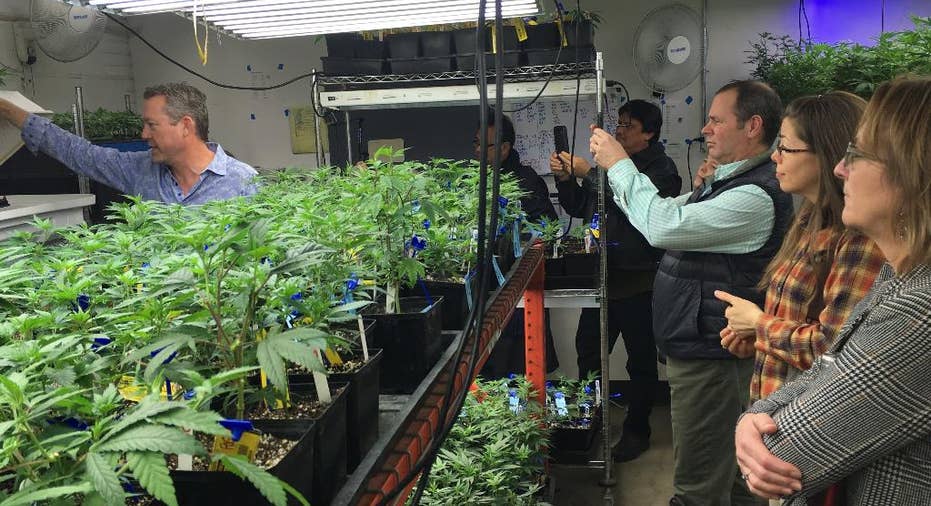Weed 101: Colorado agriculture office shares pot know-how

DENVER – Don't delay.
Don't expect help.
And get used to the smell.
Those are some marijuana lessons from the Colorado Department of Agriculture.
The agency is starting to open up about regulating cannabis, a plant the agency long ignored and snickered about.
Here are some pointers the Colorado Department of Agriculture recently shared with agriculture officials from other states during a recent convention in Denver:
DON'T WAIT
Colorado's Department of Agriculture ignored the marijuana industry for the first dozen years it was legal, figuring state agents shouldn't mess with a drug that violates federal law.
The result was a statewide industry of plant growers and processors that grew up without regulation. That gave the Agriculture Department a much tougher job later implementing things like safety guidelines and plant sampling.
Mitch Yergert, the head of Colorado's Division of Plant Industry, urged other state agriculture departments not to stick their heads in the sand and wait for the federal government to shut down the pot industry.
"You kinda gotta get your mind around it," he said.
THE FEDS WON'T HELP
Agriculture regulators routinely turn to federal agencies to regulate things like pesticides and labeling.
But when it comes to marijuana, those federal offices won't help, and may even try to block a state from copying federal regulations to apply to pot.
Some federal agencies won't even respond to emails including the word "marijuana," Yergert said.
"We had to work around that, so we'd just email 'em saying, 'Can we talk?'" he said.
HIRE MORE PEOPLE
Colorado now has 17 agriculture employees simply to regulate pot, including nine pesticide inspectors and a chemist. A dozen more staffers spend some of their time regulating hemp and marijuana, Yergert said.
He advised other states to ask budgeters for additional money and employees before pot is legalized.
"We thought we could handle it, but we about killed our staff," he said.
PREPARE FOR STINKY EMPLOYEES
Marijuana inspectors can't avoid a skunky weed tang sticking to their clothes and hair after inspecting a pot growing operation.
But Colorado is reminding its sister agencies that inspectors should be used to unpleasant odors. After all, poultry and seafood processing plants can smell just awful, but public safety relies on those plants being thoroughly inspected.
Colorado encouraged other agriculture departments to be ready for employee grumbling about bad pot smells, and to give employees a break if they personally oppose pot, like giving them time to shower after an inspection.
FIGURE OUT HOW TO MOVE IT
The U.S. Postal Service won't accept packages containing marijuana, so agriculture regulators need another plan for collecting pot samples for pesticide testing.
Colorado considered having its governor write letters for each ag inspector charged with driving pot to a lab or state office. Ultimately the state decided against the letters, but cautioned other states to implement tracking manifests or other bookkeeping to make sure pot doesn't go missing in transit, and that state employees aren't accused of trafficking the drug if pulled over by police.
DON'T WORRY ABOUT HEMP
Colorado agriculture regulators worried that some farmers would use industrial hemp as a cover for growing illegal pot, the reason hemp growing was made illegal in the first place across the U.S.
But Yerbert said the agency hasn't found any cases of someone trying to hide weed in a field of non-intoxicating hemp.
There's also little reason to worry about cross-contamination, he said.
Because the psychoactive ingredient in marijuana, THC, goes down significantly in the presence of hemp pollen, pot growers have a strong interest in keeping their plants far from hemp.
And if hemp does somehow wind up testing above the legal THC threshold to qualify as hemp, any drug produced by those plants would be so weak it would be commercially useless.
Still, Yerbert showed other state officials photos of farmer-drawn signs outside hemp fields, advertising to local law enforcement and curious neighbors that the field contains hemp, not pot.
"These signs are a good idea to say, 'Nothing to see here,'" Yerbert said.



















